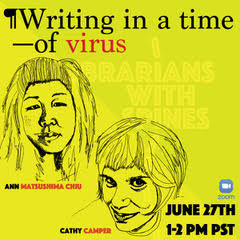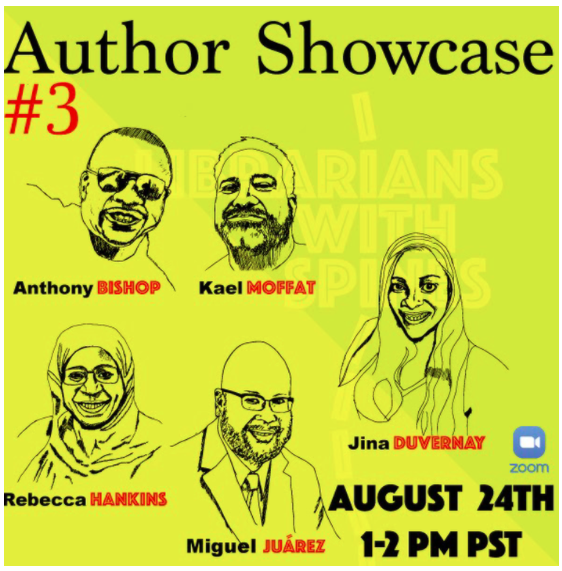Posts
Showing posts with the label Antiracism
San Jose ISchool Hispanic/Latinx Free Symposium Panels...
- Get link
- X
- Other Apps
Hispanic/Latinx Free Symposium OCTOBER 15, 2021 In celebration of National Hispanic Heritage Month (September 15 – October 15), the San José State University School of Information held a free symposium to discuss best practices in library services to meet the needs of the Hispanic/Latinx community with greater impact, cultural understanding, and sensitivity. Entitled “Making Vital Connections: Understanding and Serving the Hispanic/Latinx Community,” this inaugural event featured keynote addresses and panel discussions. I had the honor of sitting on a panel at San Jose Sate University's School Hispanic Heritage Symposium. I begin about 47 minutes in. #Antiracist #libraries #LIS #Education #HispanicHeritage #SJSU
Innovation is Crucial to Success: Antiracism is Crucial to Innovation
- Get link
- X
- Other Apps

“It is our duty to fight for our freedom. It is our duty to win. We must love each other and support each other. We have nothing to lose but our chains.” Assata Shakur American Hero and Revolutionary Innovation is so much more than technology! True innovation will only come when we break the incestuous cycle of white supremacist knowledge production. We need new voices and those voices are standing right here. Real innovation will come when people who created Hip-Hop, Jazz, Rock and Roll--when the people who created flavor in American cuisine and who pretty much generate American culture throughout the continent are involved in information production and knowledge creation. Indigenous, Black, Brown, and other people of color will create a groundswell like never before once they are allowed to fully function within the academy. We will change education's structures, its techniques, its goals, its meaning. We are the harbingers of change and we are here...
When white Librarians Reject BIPOC Librarian Input: Library Community Feedback Wanted: ALA Code of Ethics, 9th Principle (for revision)
- Get link
- X
- Other Apps

The ALA recently solicited comments on a revision to the ALA Code of Ethics's 9th principle. I added some comments to this document. The comments were full of vile racist comments and they rejected my input. This kind of treatment happens to BIPOC all the time when asked to participate in library work in general. The white gatekeepers make sure we can't create change. Here is another example of how my suggestions were rejected. Here I added, "anti-oppression actions..." If the ALA really wants input from BIPOC librarians--they should be much more respectful and not allow racist trolling on their documents.
I Was Awarded the OLA EDI Anti-Racism Recognition Award for 2021
- Get link
- X
- Other Apps

[Email from the Oregon Library Association Awards Chair. Big congratulations and shout out to Marci Ramiro-Jenkins!] Hello Oregon Library Community! As chair of the Oregon Library Association's Awards Committee, I am delighted to widely announce the recipients of the following awards which were announced at the OLA Conference on Friday, April 23. Presidents’ Award (conferred by President Kate Lasky and Past-President Elaine Hirsch): Marci Ramiro-Jenkins Oregon Library Employee of the year: Lauren Calbreath Oregon Library Supporter of the year: Barbara Wright EDI Achievement Award (Inaugural award !): Max Macias Oregon Librarian of the year: Librarians and Staff of the State Library of Oregon Children Services Division's Evelyn Sibley Lampman Award : Tehlor Kay Mejia Public Library Division's Pearl Award : Lanel Jackson Congratulations on this well deserved recognition! OLA Awards Committee: El...
San Jose State School of Information Diversity Series: Moving Beyond Diversity to Anti-Oppression
- Get link
- X
- Other Apps
Racial Equity in Data Integration
- Get link
- X
- Other Apps

Scientists, Mathematicians, Computer types and other data driven colleagues, please join us for a special antiracist session about how we can center racial equity throughout data integration in our work at PCC. Our guest speaker is Angela Bluhm! Event Date and Time: November 10th, 2020: 1pm PST Session description: Since 2019, AISP (Actionable Intelligence for Social Policy) at the University of Pennsylvania has led a diverse workgroup of civic data stakeholders to co-create strategies and identify best practices to center racial equity in data integration efforts. Angela Bluhm is an Analyst for the Educator Advancement Council in the Oregon Department of Education. Angela worked with the AISP while serving as Research, Data, and Communications Coordinator for the Oregon Longitudinal Data Collaborative in the Chief Education Office and later in the Higher Education Coordinating Commission (HECC). Angela will discuss the work of the AISP, the Toolkit for Centering Racial...
Antiracist Library or Racist Library--There is no Middle Ground
- Get link
- X
- Other Apps

Antiracist libraries acknowledge the fallacy of being neutral in the face of racism. Libraries are racist or antiracist. Just like individuals—libraries cannot just say they are ‘not racist.’ Being an antiracist library means that they are actively working to dismantle racism and white supremacy in their libraries and communities. Being antiracist also means they are working to dismantle the oppression of marginalized people. Allowing bigots to perpetuate fear in the community is antithetical to the antiracist library. The antiracist library is an enemy to bigotry. The antiracist library is constantly reflecting on ‘neutral’ stances when it comes to ALL library policies. Collection development, meeting room policies, website design, user satisfaction analysis, usage metrics and all other library policies need to be antiracist, or they are racist. There is no in between. So, when the library community says, “Libraries are for all!...
San Jose State School of Information: Moving Beyond Diversity to Anti-Oppression
- Get link
- X
- Other Apps
What does Antiracism Mean?
- Get link
- X
- Other Apps

Image source: Millenial Grind [Please note--this is not an extensive, comprehensive definition--it is my working definition.] I'm sure you have probably heard the term antiracist recently. It is a current trend for organizations and businesses to use the term antiracist in their Diversity, Equity and Inclusion documentation and activities. But what does the term Antiracist really mean? Not being racist is NOT antiracism. In fact, nobody in the americas can escape being racist in some way. Being antiracist is actively working toward creating a society that does not view individuals as representations of their entire people. Being antiracist is being actively engaged in bringing about this change in your organization. We must root out the idea that certain groups of people are superior, by their nature, and force structural change in our workplaces, organizations and society. A way of thinking. Here is what Ibram X. Kendi says about it in his boo...
Three Anti-Racist Actions YOU Can Take in Your library RIGHT NOW!
- Get link
- X
- Other Apps

"Anti-racism is the active process of identifying and eliminating racism by changing systems, organizational structures, policies and practices and attitudes, so that power is redistributed and shared equitably." - NAC International Perspectives: Women and Global Solidarity Here are three Anti-racist actions you can take today in your library: Give your library policies an anti-racist audit. Form a group from different stakeholders at your library. Recruit individuals from the administration of your organization, your union and your HR department--if possible. Pick a simple policy, practice or procedure to analyze. Notify any stakeholders who might not be included yet about your intent to audit the policy, practice or procedure. Crowdsource your analysis on a zoom whiteboard, or Google Doc, or something that makes collaboration easier. Present your findings to the group who owns said policy, practice or procedure. Ask for feedback fr...
Recording:Librarians With Spines Author Showcase One: Ann Matushima Chiu and Cathy Camper
- Get link
- X
- Other Apps

Librarians with Spines Author Showcase: Ann Matsushima Chiu and Cathy Camper 6/27/20
- Get link
- X
- Other Apps

Please join us for a conversation with Ann Matsushima Chiu and Cathy Camper on 6/27/2020 from 1-2 pm on Zoom! Both Ann and Cathy Camper were chapter authors in Librarians with Spines Vol. 1. Interviewers: Autumn Anglin, Yago Cura, Max Macias. This event is free. Add caption Please fill out the form below to register for this exciting event. We are requiring registration to avoid unwanted visitors and other forms of Zoombombing. Once you are registered, we will send you the login information. Loading…

